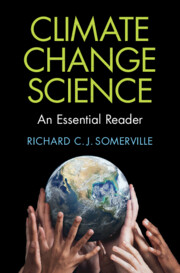Refine search
Actions for selected content:
2 results
Preface
-
- Book:
- Climate Change Science
- Published online:
- 13 November 2025
- Print publication:
- 20 November 2025, pp ix-xv
-
- Chapter
- Export citation

Climate Change Science
- An Essential Reader
-
- Published online:
- 13 November 2025
- Print publication:
- 20 November 2025
